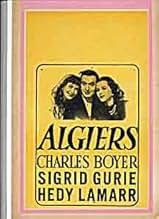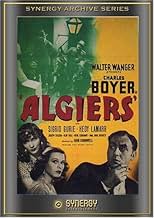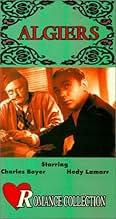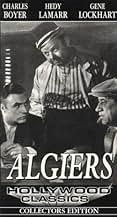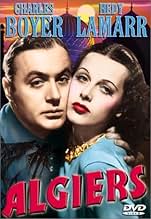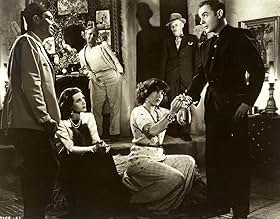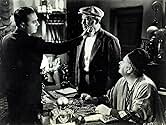IMDb-BEWERTUNG
6,6/10
3474
IHRE BEWERTUNG
Füge eine Handlung in deiner Sprache hinzuA wanted jewel thief ensconced in the Casbah meets a beautiful woman who makes him long for an escape.A wanted jewel thief ensconced in the Casbah meets a beautiful woman who makes him long for an escape.A wanted jewel thief ensconced in the Casbah meets a beautiful woman who makes him long for an escape.
- Regie
- Drehbuch
- Hauptbesetzung
- Für 4 Oscars nominiert
- 4 Gewinne & 5 Nominierungen insgesamt
Nina Koshetz
- Tania
- (as Mme. Nina Koshetz)
Empfohlene Bewertungen
Boyer doesn't actually say that, of course -- in fact, he never LEAVES the Casbah, so how could he -- but it's the general idea. I'm told this independently-produced Hollywood classic is almost a shot-for-shot remake of Duvivier's "Pepe Le Moko," from the previous year; I've never seen that one, but it's hard to believe Duvivier could have matched John Cromwell's fabulous production design, combining skillful backlot compositions with second-unit location projections, or the moody James Wong Howe photography, with the sweeping tracking shots capturing life in every corner.
The story may be no more than standard romantic hokum, but whether the filmmakers intended it or not, the movie has a wonderful existential melancholy, with Boyer's heavy eyelids viewing the world impassively, accepting his fate unquestioningly. Add to that a fine rogue's gallery of character actors (especially nice work from Gene Lockhart and Alan Hale), and you have brilliant Hollywood escapism. The judicious, sparing use of music (unusual in those Max Steiner days of underline-everything-with-a-melody) adds to the atmosphere. And it matters not a whit that Hedy Lamarr is not much of an actress here, or that every plot turn is utterly predictable.
The story may be no more than standard romantic hokum, but whether the filmmakers intended it or not, the movie has a wonderful existential melancholy, with Boyer's heavy eyelids viewing the world impassively, accepting his fate unquestioningly. Add to that a fine rogue's gallery of character actors (especially nice work from Gene Lockhart and Alan Hale), and you have brilliant Hollywood escapism. The judicious, sparing use of music (unusual in those Max Steiner days of underline-everything-with-a-melody) adds to the atmosphere. And it matters not a whit that Hedy Lamarr is not much of an actress here, or that every plot turn is utterly predictable.
The tragic account of Pepe Le Moko having been filmed in France the year before with Jean Gabin as the star must have really impressed producer Walter Wanger. It's not often that a remake is made only a year later.
Jean Gabin who has been compared to Humphrey Bogart certainly would have brought a different style of Pepe Le Moko. But this film did wonders for Charles Boyer in establishing him among the first rank of American film stars.
His Pepe is suave, cunning, and deadly. Unfortunately while hanging out in the forbidden section of French Algiers known as the Casbah, Pepe has sort of built his own prison in that section. He cannot leave because the French police will grab him and a whole bunch of countries are getting in line with the French Foreign office to deport to face a slew of crimes. But in the Casbah he's untouchable as the visiting French prefect Paul Harvey finds out.
Joseph Calleia as Inspector Slimane knows the only way to capture him is to lure him out of his shelter. And the bait for that walks in with a visiting tourist from Paris played by Hedy Lamarr.
Hedy Lamarr was under contract to MGM having been brought over by Louis B. Mayer after her scandalous nude scene in the Austrian film Ecstacy. But MGM couldn't find anything for her to do, so she stayed idle drawing her weekly paycheck while a suitable property was found.
Boyer met Lamarr at a party according to The Films of Hedy Lamarr Citadel Press Series book and was taken with her. He told Walter Wanger and Wanger worked out a deal with Mayer that they could have Lamarr if Boyer did an MGM film. The one he did was Conquest with Greta Garbo. Seems to have worked out all around.
There's a lot of debate as to how good an actress Lamarr was. And in the right circumstances she could give a decent performance. The right circumstances was definitely Algiers where Boyer knew that the woman who could stir him from his safety net had to be one extraordinarily beautiful woman. No one ever questioned that about Lamarr. Algiers launched her career for American audiences with a blowout performance.
Charles Boyer was nominated for Best Actor as Pepe, but lost to Spencer Tracy in Boys Town. And Gene Lockhart as the treacherous Regis got a nod for Best Supporting Actor, but he was beaten out by Walter Brennan in Kentucky.
What's even more extraordinary is that Director John Cromwell did a magnificent job in capturing the mood and ambiance of Algiers. A few establishing newsreel shots and great sets and you would think this was done on location.
There was a third film version of Pepe Le Moko's story with Casbah starring Tony Martin. It was a musical version that fell short of establishing Martin as a big screen draw, but the songs were some of his best selling records.
Still though Boyer does a fabulous job as Pepe, though I would some day like to see Jean Gabin's version for comparison.
Jean Gabin who has been compared to Humphrey Bogart certainly would have brought a different style of Pepe Le Moko. But this film did wonders for Charles Boyer in establishing him among the first rank of American film stars.
His Pepe is suave, cunning, and deadly. Unfortunately while hanging out in the forbidden section of French Algiers known as the Casbah, Pepe has sort of built his own prison in that section. He cannot leave because the French police will grab him and a whole bunch of countries are getting in line with the French Foreign office to deport to face a slew of crimes. But in the Casbah he's untouchable as the visiting French prefect Paul Harvey finds out.
Joseph Calleia as Inspector Slimane knows the only way to capture him is to lure him out of his shelter. And the bait for that walks in with a visiting tourist from Paris played by Hedy Lamarr.
Hedy Lamarr was under contract to MGM having been brought over by Louis B. Mayer after her scandalous nude scene in the Austrian film Ecstacy. But MGM couldn't find anything for her to do, so she stayed idle drawing her weekly paycheck while a suitable property was found.
Boyer met Lamarr at a party according to The Films of Hedy Lamarr Citadel Press Series book and was taken with her. He told Walter Wanger and Wanger worked out a deal with Mayer that they could have Lamarr if Boyer did an MGM film. The one he did was Conquest with Greta Garbo. Seems to have worked out all around.
There's a lot of debate as to how good an actress Lamarr was. And in the right circumstances she could give a decent performance. The right circumstances was definitely Algiers where Boyer knew that the woman who could stir him from his safety net had to be one extraordinarily beautiful woman. No one ever questioned that about Lamarr. Algiers launched her career for American audiences with a blowout performance.
Charles Boyer was nominated for Best Actor as Pepe, but lost to Spencer Tracy in Boys Town. And Gene Lockhart as the treacherous Regis got a nod for Best Supporting Actor, but he was beaten out by Walter Brennan in Kentucky.
What's even more extraordinary is that Director John Cromwell did a magnificent job in capturing the mood and ambiance of Algiers. A few establishing newsreel shots and great sets and you would think this was done on location.
There was a third film version of Pepe Le Moko's story with Casbah starring Tony Martin. It was a musical version that fell short of establishing Martin as a big screen draw, but the songs were some of his best selling records.
Still though Boyer does a fabulous job as Pepe, though I would some day like to see Jean Gabin's version for comparison.
While John Cromwell's Hollywood remake of Julien Duvivier's 'Pepe le Moko' from the year before is evidently the lesser film, still it has its share of artistic success. Cameraman James Wong Howe establishes a shifty, exotically attractive and morally uncertain milieu out of the casbah, the sordid urban jungle that is a city unto itself in the center of Algiers.
This is where the outcasts live, from all over the world, criminals, prostitutes, go-getters. French jewel thief Pepe lives here too, in exile but surrounded by good, loyal friends of every ethnic persuasion. Here he makes quick escapes over the rooftops and everybody protects him. The police has futile dreams of luring him out of the casbah where they can get to him, and maybe a visiting Parisian siren can be of help? Cromwell's version is very faithful to the original French film, and in every instance that I could think of is it inferior. But Howe's refined cinematography, the lighting and, most of all, Charles Boyer all make this a worthwhile watching experience. He is suave and magnetic, his accent intoxicating, and the scenes between him and the sultry Hedy Lamarr are cinema history, their meeting in the sleazy club where long, lingering closeups show the way he impresses himself on her, and this is one extremely sexy, even smoky encounter.
So, watch it, and then do yourself the favor of looking up Julien Duvivier's film, a vastly better one.
This is where the outcasts live, from all over the world, criminals, prostitutes, go-getters. French jewel thief Pepe lives here too, in exile but surrounded by good, loyal friends of every ethnic persuasion. Here he makes quick escapes over the rooftops and everybody protects him. The police has futile dreams of luring him out of the casbah where they can get to him, and maybe a visiting Parisian siren can be of help? Cromwell's version is very faithful to the original French film, and in every instance that I could think of is it inferior. But Howe's refined cinematography, the lighting and, most of all, Charles Boyer all make this a worthwhile watching experience. He is suave and magnetic, his accent intoxicating, and the scenes between him and the sultry Hedy Lamarr are cinema history, their meeting in the sleazy club where long, lingering closeups show the way he impresses himself on her, and this is one extremely sexy, even smoky encounter.
So, watch it, and then do yourself the favor of looking up Julien Duvivier's film, a vastly better one.
"Algiers" is director John Cromwell's remake of the French film, "Pepe Le Moko" which appeared only a year earlier. The Gallic flick starred Jean Gabin, then and now one of the truly great actors to emerge from that country. So Cromwell took a risk giving the lead role of jewel thief Pepe to young actor Charles Boyer. The risk paid off - and continues to do so as this fascinating prewar movie is readily available on budget-priced DVD.
Pepe is wanted in metropolitan France for stealing jewelry but not, apparently, for any crimes of violence. He's hunkered down in Algiers's famous "casbah," the native quarter whose name is evocative of mystery and, of course, sensuality. Pepe seems to be a sort of Great White Crime Boss in the native quarter where locals both protect and respect him. It's never clear how he ascended to that height.
Pepe has a beautiful lover, Ines, played by the truly gorgeous Sigrid Gurie. Legend has it that "Algiers" was to be the vehicle to propel this Scandanavian actress to wide fame but in reality her film career was rather short. The winner in this case, besides Boyer, was newcomer Hedy Lamar whose role as Gaby is central to Pepe's loss of control over his small world and, eventually, of himself.
Gaby arrives in Algiers engaged to a fat, vulgar borderline-loathsome older man who clearly regards her as a trophy bought and paid for. Why she needed this creep isn't clear. What is clear is her falling in love with Pepe who abandons the devoted and clinging Ines for this right-off-the-boat hothouse beauty.
A Parisian police official is in Algiers (Algeria, a French colony for those who don't know history) determined to collar Pepe. His forays into the casbah meet with no success and quiet derision from both the locals and some of the French police who understand that the casbah is honeycombed with escape routes and populated with folks eager to thwart the gendarmerie. A very interesting character is Inspector Slimane, Joseph Calleia. Amused by the foolish antics of his superior, Slimane knows the casbah and in his own way is determined to bring Pepe to justice. His mission isn't kept from Pepe and the two have a cordial relationship with the cop telling the crook that eventually he will be the cause of his own downfall.
Sarcastic, witty and observant, Slimane is an arresting character (pun intended). It's not clear if he's a native gone over to the police or a Frenchman who has jumped the reservation and found a more comfortable life straddling two cultures. There's something almost Russian in his outlook and words.
"Algiers" ends with a famous scene that while not at the level of the closing moments of "Casablanca" nonetheless rightfully shares pride of place with that all-time great movie.
Boyer is powerful in a role in which, through circumstances he could have controlled but didn't, he slides into a mortal abyss.
A must-see movie for anyone interested in prewar films that reflect an actually racist view of non-European life at once almost ridiculous but at the same time dramatically engaging.
And let's not forget yesterday's lunacies: Cromwell, a director with many films under his belt, was blacklisted through most of the 50s and his career never rebounded from that extra-legal punishment for non-crimes.
8/10
Pepe is wanted in metropolitan France for stealing jewelry but not, apparently, for any crimes of violence. He's hunkered down in Algiers's famous "casbah," the native quarter whose name is evocative of mystery and, of course, sensuality. Pepe seems to be a sort of Great White Crime Boss in the native quarter where locals both protect and respect him. It's never clear how he ascended to that height.
Pepe has a beautiful lover, Ines, played by the truly gorgeous Sigrid Gurie. Legend has it that "Algiers" was to be the vehicle to propel this Scandanavian actress to wide fame but in reality her film career was rather short. The winner in this case, besides Boyer, was newcomer Hedy Lamar whose role as Gaby is central to Pepe's loss of control over his small world and, eventually, of himself.
Gaby arrives in Algiers engaged to a fat, vulgar borderline-loathsome older man who clearly regards her as a trophy bought and paid for. Why she needed this creep isn't clear. What is clear is her falling in love with Pepe who abandons the devoted and clinging Ines for this right-off-the-boat hothouse beauty.
A Parisian police official is in Algiers (Algeria, a French colony for those who don't know history) determined to collar Pepe. His forays into the casbah meet with no success and quiet derision from both the locals and some of the French police who understand that the casbah is honeycombed with escape routes and populated with folks eager to thwart the gendarmerie. A very interesting character is Inspector Slimane, Joseph Calleia. Amused by the foolish antics of his superior, Slimane knows the casbah and in his own way is determined to bring Pepe to justice. His mission isn't kept from Pepe and the two have a cordial relationship with the cop telling the crook that eventually he will be the cause of his own downfall.
Sarcastic, witty and observant, Slimane is an arresting character (pun intended). It's not clear if he's a native gone over to the police or a Frenchman who has jumped the reservation and found a more comfortable life straddling two cultures. There's something almost Russian in his outlook and words.
"Algiers" ends with a famous scene that while not at the level of the closing moments of "Casablanca" nonetheless rightfully shares pride of place with that all-time great movie.
Boyer is powerful in a role in which, through circumstances he could have controlled but didn't, he slides into a mortal abyss.
A must-see movie for anyone interested in prewar films that reflect an actually racist view of non-European life at once almost ridiculous but at the same time dramatically engaging.
And let's not forget yesterday's lunacies: Cromwell, a director with many films under his belt, was blacklisted through most of the 50s and his career never rebounded from that extra-legal punishment for non-crimes.
8/10
It was made just one year after Duvivier's classic ,which even Godard (Godard!)mentioned in his "Pierrot LE Fou".Although I hate God'Art about as much as I love Duvivier,I must admit that a film that can transcend the New Wavelet's contempt possesses something magic a la "Casablanca" .
I was skeptical about the lead:aristocratic Charles Boyer replacing plebeian Gabin?I was wrong :Boyer,who began his career in France after all ,was up to scratch.And I 'd go as far as to write that Hedy Lamarr is much more attractive than Mireille Balin in the original.
All that remains is faithful like a dog: except for the scene when an old singer (Frehel) bursting into tears when she hears one of her old recordings,all the important sequences were kept.Cromwell's directing is efficient ,although it never recaptures the intensity (and the director's pessimism) of its model ,is a good film one can recommend to people who cannot get "Pepe Le Moko" .
Objections: the scene of Pierrot 's letter and the punishment of the informer is much too long and lacks suspense.Biggest gaffe is this ditty ("C'est La Vie" ) which Boyer sings and which seems out of a musical :in what is primarily a film noir,it's thoroughly incongruous.
Many of the great lines of the French classic can be heard ,notably the famous "I'm an informer,I'm not a hypocrite",and the Boyer/Lamarr pairing displays a special chemistry .The black and white makes a good use of shadows and lights.
If all the remakes were made with care like this one.....
I was skeptical about the lead:aristocratic Charles Boyer replacing plebeian Gabin?I was wrong :Boyer,who began his career in France after all ,was up to scratch.And I 'd go as far as to write that Hedy Lamarr is much more attractive than Mireille Balin in the original.
All that remains is faithful like a dog: except for the scene when an old singer (Frehel) bursting into tears when she hears one of her old recordings,all the important sequences were kept.Cromwell's directing is efficient ,although it never recaptures the intensity (and the director's pessimism) of its model ,is a good film one can recommend to people who cannot get "Pepe Le Moko" .
Objections: the scene of Pierrot 's letter and the punishment of the informer is much too long and lacks suspense.Biggest gaffe is this ditty ("C'est La Vie" ) which Boyer sings and which seems out of a musical :in what is primarily a film noir,it's thoroughly incongruous.
Many of the great lines of the French classic can be heard ,notably the famous "I'm an informer,I'm not a hypocrite",and the Boyer/Lamarr pairing displays a special chemistry .The black and white makes a good use of shadows and lights.
If all the remakes were made with care like this one.....
Wusstest du schon
- WissenswertesAnimator Chuck Jones based the Warner Brothers cartoon character "Pepe Le Pew" on Pepe le Moko (Charles Boyer).
- Patzer(at around 17 mins) Pepe teases Ines by saying the ring is "for some fat old woman". Ines spins counterclockwise nearly 360° and, again facing Pepe, says "Let me have it, Pepe". Then there is a slight, but noticeable, film cut before Ines adds, "Sometime I'll get fat."
- Zitate
Inspector Slimane: When one can't use guns, one must work with brains.
Commissioner Janvier: I prefer guns!
Inspector Slimane: In your case, honest sir, such a preference is unavoidable.
- Crazy CreditsWhen complete cast credits are listed at the start of a movie and at the end, there are usually no changes. In this movie, the end credits reverse the order of the last two credits: Bert Roach follows Ben Hall.
- Alternative VersionenSome prints have a different opening credits sequence, in which the credits are shown against a black background.
- VerbindungenEdited into Your Afternoon Movie: Algiers (2022)
Top-Auswahl
Melde dich zum Bewerten an und greife auf die Watchlist für personalisierte Empfehlungen zu.
- How long is Algiers?Powered by Alexa
Details
- Laufzeit1 Stunde 36 Minuten
- Farbe
- Seitenverhältnis
- 1.37 : 1
Zu dieser Seite beitragen
Bearbeitung vorschlagen oder fehlenden Inhalt hinzufügen



